

12 of the Best Books of Literary Criticism Everyone Should Read
By Dr Oliver Tearle (Loughborough University)
Literary criticism (or even ‘literary theory’) goes back as far as ancient Greece, and Aristotle’s Poetics . But the rise of English Literature as a university subject, at the beginning of the twentieth century, led to literary criticism focusing on English literature – everything from Shakespeare to contemporary literature – being taken seriously.
Numerous masterpieces have been produced in the ‘genre’: here are a dozen of the most significant and notable works of literary criticism written in English.
Disclaimer: as an Amazon Associate, we get commissions for purchases made through links in this post.
1. F. H. Bradley, Shakespearean Tragedy .
In 1904, this immeasurably influential study of Shakespeare’s tragedies appeared. It is still in print – as an affordable Penguin Classics edition – and although Bradley sometimes treats the characters a little too much as though they were real people rather than imaginary constructions, there’s a raft of lucid insights into the plays to be had. Given how early this landmark work of literary criticism was published, it’s still endlessly readable thanks to Bradley’s colloquial and relatable style.
2. I. A. Richards, Practical Criticism .
Published in 1929, this book is as much the write-up to an educational experiment as it is a work of traditional literary criticism. Richards, whose lectures were hugely popular at Cambridge during the 1920s, gave his students a series of short poems with the authors and dates removed. This encouraged students to respond to the words on the page, paying close attention to the form and style of the poem and their response to the poem’s features. Richards’s work would influence American New Criticism in the mid-twentieth century – and his most famous pupil, William Empson …
3. William Empson, Seven Types of Ambiguity .
William Empson (1906-1984) was a poet as well as a critic , and this probably helped him to get under the skin, as it were, of many of the poems he analyses in this pioneering work of poetry criticism, published in 1930 and written when he was still only in his early twenties (and completed shortly after he had been expelled from the University of Cambridge when contraceptives were found in his rooms).
Taking his examples from Geoffrey Chaucer as well as T. S. Eliot, Empson wittily examines the various ways in which poets generate ambiguity in their work, from simple examples to more complex and less easily resolved instances. Jonathan Bate called Empson the funniest critic of the twentieth century. He is also one of the most illuminating.
4. Caroline Spurgeon, Shakespeare’s Imagery and What It Tells Us .
This landmark work of literary analysis was first published in 1934, and is a fascinating study of Shakespeare’s writing and well worth reading. Spurgeon examines the images of Shakespeare’s plays in order to find out what sorts of images he most frequently draws on and what this might tell us about him, especially in terms of his relation to his contemporaries.
Stephen Fry has called it a sort of early version of what we’d now call digital fingerprinting, whereby digital analysis shows word frequencies and usage in Shakespeare’s work. It is a good study of what makes Shakespeare so peculiar alongside his fellow Elizabethan and Jacobean writers.
5. F. R. Leavis, The Great Tradition .

6. M. H. Abrams, The Mirror and the Lamp .
Not to be confused with the title of a Hilary Mantel novel, this ground-breaking study of Romanticism was published in 1953 and showed how, until the Romantics, art was seen to reflect the world (like a mirror), whereas the Romantics – and various writers and critics who have come along since – thought that art should illuminate the world (like a light). Abrams was born in 1912 and died at the ripe old age of 102 in 2015; this remained his most significant work, and one of the most important mid-century works of literary criticism.
7. Northrop Frye, Anatomy of Criticism .
When literary critics of some reputation taught at summer schools in the mid-twentieth century, they would often teach ‘the poetry course’ or ‘the Shakespeare course’. When Frye turned up to teach, he’d be asked to teach ‘the Northrop Frye course’.
As this anecdote suggests, Frye’s influence on twentieth-century literary criticism was vast and distinguished, and he was writing at the peak of his powers when he penned this 1957 ‘anatomy’ of types of literature, adopting a structuralist approach to genre and form. Among other things, Frye’s book makes you want to go away and read all of the famous works of poetry, drama, and fiction which he draws upon.
8. Gayatri Chakravorty Spivak, In Other Worlds: Essays in Cultural Politics .
Bringing together various ‘isms’ and literary theories from the twentieth century, including feminist literary criticism, Marxism, and Jacques Derrida’s deconstruction, Spivak offers what might be described as an intersectional analysis of the relationship between women and their language and culture, in both western and non-western cultures. This book is as much cultural theory as it is literary criticism, although it also contains some astute readings of Woolf’s To the Lighthouse , Yeats’s work, and Wordsworth’s The Prelude .
9. Sandra M. Gilbert and Susan Gubar, The Madwoman in the Attic .
Published in 1979, this joint-authored book is a vast and highly readable study of Victorian fiction written by women, including the Brontës and George Eliot. The book’s title, of course, is taken from Bertha Mason/Rochester, Mr Rochester’s first wife whom he locks away in his house (technically, in the room below the attic) in Jane Eyre . Gilbert and Gubar’s enjoyable and perceptive analysis of the various tropes, symbols, and images nineteenth-century female novelists employed in their work makes for a provocative and persuasive account of the ways in which women negotiated the patriarchal society about which, and in which, they wrote.
10. Christopher Ricks, The Force of Poetry .
This 1984 volume is a collection of essays written during the 1960s-1980s, by one of the greatest living critics of poetry. Upon reading Ricks’s biography of Tennyson, W. H. Auden called Ricks ‘exactly the kind of critic every poet dreams of finding’. But Ricks is also a brilliant writer too, with a fondness (some would say weakness) for puns and wordplay of all kinds. He clearly has great fun pondering the significance of a semi-colon or set of parentheses, or the meaning of a particular image or word. This volume includes essays on, among others, medieval poet John Gower, John Milton, Samuel Johnson, Geoffrey Hill, and Stevie Smith.
11. Nicholas Royle, Telepathy and Literature: Essays on the Reading Mind .
Ranging from Shakespeare to Raymond Chandler, Royle reads canonical and non-canonical works of fiction, poetry, and drama through the lens of telepathy, exploring new ways of thinking about literary texts and the relationship between reader and author. Influenced by Derrida but far more accessible, Royle’s readings are perhaps the best way to begin learning how to write ‘creative criticism’: criticism that reimagines what the literary-critical essay might look like, while still offering some wonderfully nuanced and sensitive close readings of the texts under discussion.
12. Eleanor Cook, Against Coercion: Games Poets Play .
Cook, who taught at the University of Toronto, collected some of her most important essays on a range of poets – including T. S. Eliot and Wallace Stevens – in this book in 1998. From the opening essay, in which Cook convincingly argues that Eliot’s The Waste Land was partly a response to Eliot’s reading of John Maynard Keynes’s The Economic Consequences of the Peace , it’s clear that Cook is a superlative critic who marries close reading of classic works of poetry to their various literary, social, and economic contexts. Cook has written other fine books, including a study of riddles and enigmas throughout literature, but this is the place to begin.
Discover more from Interesting Literature
Subscribe to get the latest posts sent to your email.
Type your email…
4 thoughts on “12 of the Best Books of Literary Criticism Everyone Should Read”
John Updike Hugging the Shore is an excellent read ..prompted me to reread and appreciate Melville.
Thanks for the reading list there
I like the numerous works of the eminent US critic Harold Bloom – incl his books Genius and The Western Canon
Well worth obtaining
Thanks for this – I’m a big fan of literary criticism, and have for a long time been trying to get more people to see its beauty and value. Regarding Leavisite criticism, I’d recommend to all Matthew Arnold’s ‘Culture and Anarchy’ (or his essay ‘Preface to Poetry’), too; I think there’s a strong association between the types of criticism they wrote. Some of T. S. Eliot’s critical essays are also filled with intellectual verve. I’ll certainly look into Royle’s ‘Telepathy’, sounds like it’d be a good read!
“Mimesis: The Representation of Reality in Western Literature” by Erich Auerbach, 1946.
https://press.princeton.edu/books/paperback/9780691160221/mimesis
Leave a Reply Cancel reply
Subscribe now to keep reading and get access to the full archive.
Continue reading
52 Literary Criticism Essay Topic Ideas & Examples
🏆 best literary criticism topic ideas & essay examples, 🎓 good research topics about literary criticism, 🥇 interesting topics to write about literary criticism.
- Literary Criticism on Adventures of Huckleberry Finn In the essay, Wallace examines the racism in the novel in a bid to protect the African Americans from “mental cruelty and harassment depicted in the novel.
- Formalist Strategies in Literary Criticism If we analyze the approach of a formalist critic we would see that this form of criticism is more dependent on imageries presented in the text rather than the basics of the literature.
- Feminist Approach in Literary Criticism The reason for this is simple this particular plot’s development suggests that, just as it happened to be the case with the functioning of a male psyche, the working of a female psyche implies that […]
- Theories of Literary Criticism: Social and Literary Philosophy This essay engages in an in-depth, meaningful, and critical discussion of the most significant theories of public criticism.
- Literary and Theatrical Criticism on Ibsen’s “Enemy of the People” It was an essential part of Ibsen’s dramatic talent that he embodied the problems and conflicts of his own personality in the characters of his plays.
- The Literary Criticism of Agnosticism Agnostics have been unable to take a stand in the issue due to their inability to make a decision and it is advisable that agnostics emulate theists and atheists.
- Literary Criticism of The Yellow Wallpaper by Gilman When she is isolated in the room, she notices a shadow emerging from the wallpaper and creeping over the walls and floor.
- Literary Criticism: The Negro Speaks of Rivers by Langston Hughes This paper examines the poem “The Negro Speaks of Rivers” by Langston Hughes and delineates the meaning by focusing on the various elements in the poem like setting, the background of the author, and the […]
- “Contemporary Literary Criticism” by Lowell His collection of poems “The Mills of the Kavanaughs” was written under the influence of Robert Frost and Robert Browning. The poem is mixed with images of death and a young boy’s love for his […]
- The Concept of Literary Criticism Feminist literary criticism is focused on the analysis of texts from the feminist perspective. Feminist literary criticism is based on the feminist theory and broad politics of feminism.
- New Criticism in the English and American Literature Consequently, any effort to state the meaning of the poem appears to be heretical, as it is an affront to the honesty of the complex arrangement of sense within the literary creation.
- Applying Marxist Literary Criticism to “Of Mice and Men”
- Biblical Literary Criticism: Higher Criticism
- Charles Dickens Novels Literary Criticism
- Classical and Literary Traditions in Literary Criticism
- Fahrenheit 451: Literary Criticism and Critical Analysis
- Feminist Literary Criticism: Feminist Critical Theory
- The Link Between Formalism and the School of Literary Criticism
- Peculiarities of Applying Literary Criticism to Graphic Novels
- Jane Tompkins’ Revolutionary Approach to Literary Criticism
- Analysis of Ecocriticism as a Literary Criticism
- Linking Literary Criticism and Linguistics
- The Parallels Between Literary Criticism and Marxist Criticism
- Margit Stange’s Literary Criticism of Chopin’s “The Awakening”
- Magical Realism Literature Literary Criticism
- Marxist Literary Criticism Applied to Middlemarch
- Post Structuralist Literary Criticism of English Literature
- The Relationships Between Literary Theories and Literary Criticism
- Correlations Between Psychoanalysis and Literary Criticism
- Romantic Literary Criticism Criticism: Background and Overviews
- Satire and Hypocrisy: Literary Criticism of Lewis’ “The Monk”
- The Link Between American Narrative and Literary Criticism
- Romantic Literary Criticism Criticism: The German Romantics
- The Feminist Literary Criticism: Women’s Struggle
- The Contemporary Literary Criticism of Frank McCourt’s Poetry
- The Relations Between Structuralism and Literary Criticism
- The Four Basic Approaches to Literary Criticism
- “The Great Gatsby” Through a Marxist Literary Criticism Lens
- The Important Things Regarding Professional Literary Criticism
- The Purpose and Usage of Literary Criticism
- Discussion on the African American Literary Criticism
- Pros and Cons of Literary Criticism
- Literary Criticism of “Well in a Wrinkle in Time” by Madeleine L’Engle
- Different Perspectives of Literary Criticism on the Works of Literature
- Journey Through Digital Literature: Hidden Literature and Literary Criticism in Video Games
- Feminist Literary Criticism of Rip Van Winkle
- Overview of Methods of Feminist Literary Criticism
- Literary Criticism of “A White Heron” by Sarah Orne Jewett
- Feminist Literary Criticism of the Yellow Wallpaper
- Literary Criticism as a Study With Its Functions
- Overview of New Historicism in Literary Criticism
- Canterbury Tales Research Ideas
- A Good Man Is Hard to Find Essay Ideas
- Pride and Prejudice Essay Ideas
- Sir Gawain and the Green Knight Research Topics
- The Great Gatsby Ideas
- The Glass Castle Paper Topics
- The Metamorphosis Research Topics
- Uncle Tom’s Cabin Essay Topics
- Chicago (A-D)
- Chicago (N-B)
IvyPanda. (2024, February 28). 52 Literary Criticism Essay Topic Ideas & Examples. https://ivypanda.com/essays/topic/literary-criticism-essay-topics/
"52 Literary Criticism Essay Topic Ideas & Examples." IvyPanda , 28 Feb. 2024, ivypanda.com/essays/topic/literary-criticism-essay-topics/.
IvyPanda . (2024) '52 Literary Criticism Essay Topic Ideas & Examples'. 28 February.
IvyPanda . 2024. "52 Literary Criticism Essay Topic Ideas & Examples." February 28, 2024. https://ivypanda.com/essays/topic/literary-criticism-essay-topics/.
1. IvyPanda . "52 Literary Criticism Essay Topic Ideas & Examples." February 28, 2024. https://ivypanda.com/essays/topic/literary-criticism-essay-topics/.
Bibliography
IvyPanda . "52 Literary Criticism Essay Topic Ideas & Examples." February 28, 2024. https://ivypanda.com/essays/topic/literary-criticism-essay-topics/.
IvyPanda uses cookies and similar technologies to enhance your experience, enabling functionalities such as:
- Basic site functions
- Ensuring secure, safe transactions
- Secure account login
- Remembering account, browser, and regional preferences
- Remembering privacy and security settings
- Analyzing site traffic and usage
- Personalized search, content, and recommendations
- Displaying relevant, targeted ads on and off IvyPanda
Please refer to IvyPanda's Cookies Policy and Privacy Policy for detailed information.
Certain technologies we use are essential for critical functions such as security and site integrity, account authentication, security and privacy preferences, internal site usage and maintenance data, and ensuring the site operates correctly for browsing and transactions.
Cookies and similar technologies are used to enhance your experience by:
- Remembering general and regional preferences
- Personalizing content, search, recommendations, and offers
Some functions, such as personalized recommendations, account preferences, or localization, may not work correctly without these technologies. For more details, please refer to IvyPanda's Cookies Policy .
To enable personalized advertising (such as interest-based ads), we may share your data with our marketing and advertising partners using cookies and other technologies. These partners may have their own information collected about you. Turning off the personalized advertising setting won't stop you from seeing IvyPanda ads, but it may make the ads you see less relevant or more repetitive.
Personalized advertising may be considered a "sale" or "sharing" of the information under California and other state privacy laws, and you may have the right to opt out. Turning off personalized advertising allows you to exercise your right to opt out. Learn more in IvyPanda's Cookies Policy and Privacy Policy .
Have a language expert improve your writing
Run a free plagiarism check in 10 minutes, generate accurate citations for free.
- Knowledge Base
- How to write a literary analysis essay | A step-by-step guide
How to Write a Literary Analysis Essay | A Step-by-Step Guide
Published on January 30, 2020 by Jack Caulfield . Revised on August 14, 2023.
Literary analysis means closely studying a text, interpreting its meanings, and exploring why the author made certain choices. It can be applied to novels, short stories, plays, poems, or any other form of literary writing.
A literary analysis essay is not a rhetorical analysis , nor is it just a summary of the plot or a book review. Instead, it is a type of argumentative essay where you need to analyze elements such as the language, perspective, and structure of the text, and explain how the author uses literary devices to create effects and convey ideas.
Before beginning a literary analysis essay, it’s essential to carefully read the text and c ome up with a thesis statement to keep your essay focused. As you write, follow the standard structure of an academic essay :
- An introduction that tells the reader what your essay will focus on.
- A main body, divided into paragraphs , that builds an argument using evidence from the text.
- A conclusion that clearly states the main point that you have shown with your analysis.
Instantly correct all language mistakes in your text
Upload your document to correct all your mistakes in minutes

Table of contents
Step 1: reading the text and identifying literary devices, step 2: coming up with a thesis, step 3: writing a title and introduction, step 4: writing the body of the essay, step 5: writing a conclusion, other interesting articles.
The first step is to carefully read the text(s) and take initial notes. As you read, pay attention to the things that are most intriguing, surprising, or even confusing in the writing—these are things you can dig into in your analysis.
Your goal in literary analysis is not simply to explain the events described in the text, but to analyze the writing itself and discuss how the text works on a deeper level. Primarily, you’re looking out for literary devices —textual elements that writers use to convey meaning and create effects. If you’re comparing and contrasting multiple texts, you can also look for connections between different texts.
To get started with your analysis, there are several key areas that you can focus on. As you analyze each aspect of the text, try to think about how they all relate to each other. You can use highlights or notes to keep track of important passages and quotes.
Language choices
Consider what style of language the author uses. Are the sentences short and simple or more complex and poetic?
What word choices stand out as interesting or unusual? Are words used figuratively to mean something other than their literal definition? Figurative language includes things like metaphor (e.g. “her eyes were oceans”) and simile (e.g. “her eyes were like oceans”).
Also keep an eye out for imagery in the text—recurring images that create a certain atmosphere or symbolize something important. Remember that language is used in literary texts to say more than it means on the surface.
Narrative voice
Ask yourself:
- Who is telling the story?
- How are they telling it?
Is it a first-person narrator (“I”) who is personally involved in the story, or a third-person narrator who tells us about the characters from a distance?
Consider the narrator’s perspective . Is the narrator omniscient (where they know everything about all the characters and events), or do they only have partial knowledge? Are they an unreliable narrator who we are not supposed to take at face value? Authors often hint that their narrator might be giving us a distorted or dishonest version of events.
The tone of the text is also worth considering. Is the story intended to be comic, tragic, or something else? Are usually serious topics treated as funny, or vice versa ? Is the story realistic or fantastical (or somewhere in between)?
Consider how the text is structured, and how the structure relates to the story being told.
- Novels are often divided into chapters and parts.
- Poems are divided into lines, stanzas, and sometime cantos.
- Plays are divided into scenes and acts.
Think about why the author chose to divide the different parts of the text in the way they did.
There are also less formal structural elements to take into account. Does the story unfold in chronological order, or does it jump back and forth in time? Does it begin in medias res —in the middle of the action? Does the plot advance towards a clearly defined climax?
With poetry, consider how the rhyme and meter shape your understanding of the text and your impression of the tone. Try reading the poem aloud to get a sense of this.
In a play, you might consider how relationships between characters are built up through different scenes, and how the setting relates to the action. Watch out for dramatic irony , where the audience knows some detail that the characters don’t, creating a double meaning in their words, thoughts, or actions.
Here's why students love Scribbr's proofreading services
Discover proofreading & editing
Your thesis in a literary analysis essay is the point you want to make about the text. It’s the core argument that gives your essay direction and prevents it from just being a collection of random observations about a text.
If you’re given a prompt for your essay, your thesis must answer or relate to the prompt. For example:
Essay question example
Is Franz Kafka’s “Before the Law” a religious parable?
Your thesis statement should be an answer to this question—not a simple yes or no, but a statement of why this is or isn’t the case:
Thesis statement example
Franz Kafka’s “Before the Law” is not a religious parable, but a story about bureaucratic alienation.
Sometimes you’ll be given freedom to choose your own topic; in this case, you’ll have to come up with an original thesis. Consider what stood out to you in the text; ask yourself questions about the elements that interested you, and consider how you might answer them.
Your thesis should be something arguable—that is, something that you think is true about the text, but which is not a simple matter of fact. It must be complex enough to develop through evidence and arguments across the course of your essay.
Say you’re analyzing the novel Frankenstein . You could start by asking yourself:
Your initial answer might be a surface-level description:
The character Frankenstein is portrayed negatively in Mary Shelley’s Frankenstein .
However, this statement is too simple to be an interesting thesis. After reading the text and analyzing its narrative voice and structure, you can develop the answer into a more nuanced and arguable thesis statement:
Mary Shelley uses shifting narrative perspectives to portray Frankenstein in an increasingly negative light as the novel goes on. While he initially appears to be a naive but sympathetic idealist, after the creature’s narrative Frankenstein begins to resemble—even in his own telling—the thoughtlessly cruel figure the creature represents him as.
Remember that you can revise your thesis statement throughout the writing process , so it doesn’t need to be perfectly formulated at this stage. The aim is to keep you focused as you analyze the text.
Finding textual evidence
To support your thesis statement, your essay will build an argument using textual evidence —specific parts of the text that demonstrate your point. This evidence is quoted and analyzed throughout your essay to explain your argument to the reader.
It can be useful to comb through the text in search of relevant quotations before you start writing. You might not end up using everything you find, and you may have to return to the text for more evidence as you write, but collecting textual evidence from the beginning will help you to structure your arguments and assess whether they’re convincing.
To start your literary analysis paper, you’ll need two things: a good title, and an introduction.
Your title should clearly indicate what your analysis will focus on. It usually contains the name of the author and text(s) you’re analyzing. Keep it as concise and engaging as possible.
A common approach to the title is to use a relevant quote from the text, followed by a colon and then the rest of your title.
If you struggle to come up with a good title at first, don’t worry—this will be easier once you’ve begun writing the essay and have a better sense of your arguments.
“Fearful symmetry” : The violence of creation in William Blake’s “The Tyger”
The introduction
The essay introduction provides a quick overview of where your argument is going. It should include your thesis statement and a summary of the essay’s structure.
A typical structure for an introduction is to begin with a general statement about the text and author, using this to lead into your thesis statement. You might refer to a commonly held idea about the text and show how your thesis will contradict it, or zoom in on a particular device you intend to focus on.
Then you can end with a brief indication of what’s coming up in the main body of the essay. This is called signposting. It will be more elaborate in longer essays, but in a short five-paragraph essay structure, it shouldn’t be more than one sentence.
Mary Shelley’s Frankenstein is often read as a crude cautionary tale about the dangers of scientific advancement unrestrained by ethical considerations. In this reading, protagonist Victor Frankenstein is a stable representation of the callous ambition of modern science throughout the novel. This essay, however, argues that far from providing a stable image of the character, Shelley uses shifting narrative perspectives to portray Frankenstein in an increasingly negative light as the novel goes on. While he initially appears to be a naive but sympathetic idealist, after the creature’s narrative Frankenstein begins to resemble—even in his own telling—the thoughtlessly cruel figure the creature represents him as. This essay begins by exploring the positive portrayal of Frankenstein in the first volume, then moves on to the creature’s perception of him, and finally discusses the third volume’s narrative shift toward viewing Frankenstein as the creature views him.
Some students prefer to write the introduction later in the process, and it’s not a bad idea. After all, you’ll have a clearer idea of the overall shape of your arguments once you’ve begun writing them!
If you do write the introduction first, you should still return to it later to make sure it lines up with what you ended up writing, and edit as necessary.
The body of your essay is everything between the introduction and conclusion. It contains your arguments and the textual evidence that supports them.
Paragraph structure
A typical structure for a high school literary analysis essay consists of five paragraphs : the three paragraphs of the body, plus the introduction and conclusion.
Each paragraph in the main body should focus on one topic. In the five-paragraph model, try to divide your argument into three main areas of analysis, all linked to your thesis. Don’t try to include everything you can think of to say about the text—only analysis that drives your argument.
In longer essays, the same principle applies on a broader scale. For example, you might have two or three sections in your main body, each with multiple paragraphs. Within these sections, you still want to begin new paragraphs at logical moments—a turn in the argument or the introduction of a new idea.
Robert’s first encounter with Gil-Martin suggests something of his sinister power. Robert feels “a sort of invisible power that drew me towards him.” He identifies the moment of their meeting as “the beginning of a series of adventures which has puzzled myself, and will puzzle the world when I am no more in it” (p. 89). Gil-Martin’s “invisible power” seems to be at work even at this distance from the moment described; before continuing the story, Robert feels compelled to anticipate at length what readers will make of his narrative after his approaching death. With this interjection, Hogg emphasizes the fatal influence Gil-Martin exercises from his first appearance.
Topic sentences
To keep your points focused, it’s important to use a topic sentence at the beginning of each paragraph.
A good topic sentence allows a reader to see at a glance what the paragraph is about. It can introduce a new line of argument and connect or contrast it with the previous paragraph. Transition words like “however” or “moreover” are useful for creating smooth transitions:
… The story’s focus, therefore, is not upon the divine revelation that may be waiting beyond the door, but upon the mundane process of aging undergone by the man as he waits.
Nevertheless, the “radiance” that appears to stream from the door is typically treated as religious symbolism.
This topic sentence signals that the paragraph will address the question of religious symbolism, while the linking word “nevertheless” points out a contrast with the previous paragraph’s conclusion.
Using textual evidence
A key part of literary analysis is backing up your arguments with relevant evidence from the text. This involves introducing quotes from the text and explaining their significance to your point.
It’s important to contextualize quotes and explain why you’re using them; they should be properly introduced and analyzed, not treated as self-explanatory:
It isn’t always necessary to use a quote. Quoting is useful when you’re discussing the author’s language, but sometimes you’ll have to refer to plot points or structural elements that can’t be captured in a short quote.
In these cases, it’s more appropriate to paraphrase or summarize parts of the text—that is, to describe the relevant part in your own words:
Receive feedback on language, structure, and formatting
Professional editors proofread and edit your paper by focusing on:
- Academic style
- Vague sentences
- Style consistency
See an example

The conclusion of your analysis shouldn’t introduce any new quotations or arguments. Instead, it’s about wrapping up the essay. Here, you summarize your key points and try to emphasize their significance to the reader.
A good way to approach this is to briefly summarize your key arguments, and then stress the conclusion they’ve led you to, highlighting the new perspective your thesis provides on the text as a whole:
If you want to know more about AI tools , college essays , or fallacies make sure to check out some of our other articles with explanations and examples or go directly to our tools!
- Ad hominem fallacy
- Post hoc fallacy
- Appeal to authority fallacy
- False cause fallacy
- Sunk cost fallacy
College essays
- Choosing Essay Topic
- Write a College Essay
- Write a Diversity Essay
- College Essay Format & Structure
- Comparing and Contrasting in an Essay
(AI) Tools
- Grammar Checker
- Paraphrasing Tool
- Text Summarizer
- AI Detector
- Plagiarism Checker
- Citation Generator
By tracing the depiction of Frankenstein through the novel’s three volumes, I have demonstrated how the narrative structure shifts our perception of the character. While the Frankenstein of the first volume is depicted as having innocent intentions, the second and third volumes—first in the creature’s accusatory voice, and then in his own voice—increasingly undermine him, causing him to appear alternately ridiculous and vindictive. Far from the one-dimensional villain he is often taken to be, the character of Frankenstein is compelling because of the dynamic narrative frame in which he is placed. In this frame, Frankenstein’s narrative self-presentation responds to the images of him we see from others’ perspectives. This conclusion sheds new light on the novel, foregrounding Shelley’s unique layering of narrative perspectives and its importance for the depiction of character.
Cite this Scribbr article
If you want to cite this source, you can copy and paste the citation or click the “Cite this Scribbr article” button to automatically add the citation to our free Citation Generator.
Caulfield, J. (2023, August 14). How to Write a Literary Analysis Essay | A Step-by-Step Guide. Scribbr. Retrieved September 14, 2024, from https://www.scribbr.com/academic-essay/literary-analysis/
Is this article helpful?

Jack Caulfield
Other students also liked, how to write a thesis statement | 4 steps & examples, academic paragraph structure | step-by-step guide & examples, how to write a narrative essay | example & tips, "i thought ai proofreading was useless but..".
I've been using Scribbr for years now and I know it's a service that won't disappoint. It does a good job spotting mistakes”
Literary Criticism for Students (and anyone else)
Getting started, research strategies, online encyclopedias, literary criticism databases, author biography, defining terms and concepts.
- Finding Books & Media
- Finding Articles
- Online Resources
- Literary Theory
- Writing Resources
- Citing Sources
- Print Reference
- Research Services
- Reader Services

What is Literary Criticism?
According to the Oxford English Dictionary, literary criticism is "The art or practice of judging and commenting on the qualities and character of a literary work; consideration or analysis of a text in relation to language, structure, biography, history, etc., or (in later use, freq. with modifying word) by a particular philosophical, political, or linguistic method; (also) an instance of this, esp. in a written form; a school or method of criticizing literature.
- Library research, reading, and note-taking are time consuming. When planning your time, make sure to take this into account and leave sufficient time for writing, reviewing, and proofreading your paper.
- Request material to come to a branch convenient to you (5-7 days)
- Request material through Interlibrary Loan (3-4 weeks)
- Plan a visit to the Research Library at Copley Square to use in-library-use-only material.
- Use Gale Virtual Reference Library (GVRL) to obtain an overview essay on your author, title, or topic and use that as the starting point for creating a tentative outline and thesis statement for your paper. Note: When searching GVRL consider not limiting your search to the literature sources. An unrestricted search returns results from a wide variety of sources some of which could prove useful to your research. Note: GVRL has a translate feature which should facilitate use of the database for those who do not speak English as a first language. Watch the tutorial .
- Use the literary criticism databases on this page to explore your topic further. This will help to determine whether there is sufficient material to support your thesis or perhaps lead you in a different direction. Note: Literature Criticism Online can be browsed by topic, which can be useful in suggesting new topics connected to your original search. Note: Literature Resource Center also has a translate feature.
- Use the bibliographies found in relevant articles to expand your range of sources.
- When taking notes, make sure to put quotation marks around any words that are not your own and take down all the necessary publication information that you will need for your works-cited list, including page numbers and date of access if you are using a website. Note: You do not need to document material that is common knowledge.
- Credo Reference This link opens in a new window Credo Reference is a giant online reference library that provides access to as many as 162 reference books, including encyclopedias, dictionaries, thesauri, books of quotations, as well as a range of subject-specific titles all cross-referenced throughout the collection. Special features include a crossword solver and conversion calculators.
- Gale eBooks This link opens in a new window Gale Virtual Reference Library includes more than 90 encyclopedias, plus numerous specialized reference sources covering a diversity of subject including Arts, Biography, Business, Education, Environment, History, Law, Literature, Medicine, Multicultural Studies, Nation & World, Religion, Science, and Social Science. The Literature collection includes the popular literary criticism sets Drama for Students, Novels for Students, Poetry for Students, Shakespeare for Students, Short Stories for Students, and more. more... less... Includes more than 90 encyclopedias, plus numerous specialized reference sources covering a diversity of subjects including Arts, Biography, Business, Education, Environment, History, Law, Literature, Medicine, Multicultural Studies, Nation & World, Religion, Science, and Social Science. Some "Junior" sources included as well.
- Gale Literature Resource Center This link opens in a new window Literature Resource Center pulls together materials from many different print and online sources, including scholarly journals, literary reviews, reference books, authoritative websites, and more. The Research Guide walks you through the process of writing a research paper on a literature topic, from choosing a topic to gathering information, from formulating a thesis statement to writing, revising, and preparing a Works Cited page.
- Gale Literature This link opens in a new window An integrated search for Literature Criticism Online, Literature Resource Center, and Modern Language Association (MLA) International Bibliography.
- Gale Literature Criticism This link opens in a new window Literature Criticism Online provides tens of thousands of hard-to-find essays on books and plays by the scholars of today and from the past. This resource includes full-text criticism from ten different sources: Contemporary Literary Criticism, Twentieth-Century Literary Criticism, Nineteenth-Century Literature Criticism, Shakespeare Criticism, Literature Criticism 1400-1800, Classical and Medieval Literature Criticism, Poetry Criticism, Short Story Criticism, Drama Criticism, Children's Literature Review
- Gale In Context: Biography This link opens in a new window Nearly 300,000 full-text biographies gathered from Gale's award-winning reference sources and 250 periodicals specifically chosen for their renowned biographical content in a broad range of subject areas.
- A Glossary of Literary Terms A listing of terms with explanations and examples.
- Oxford English Dictionary This link opens in a new window The Oxford English Dictionary (OED) is a recognized authority on the evolution of the English language over the last millennium. It is a guide to the meaning, history and pronunciation of over half a million words.
- Next: Finding Books & Media >>
- Last Updated: Sep 4, 2024 9:37 AM
- URL: https://guides.bpl.org/literarycriticism
Home > Journals > Criterion
Criterion: A Journal of Literary Criticism seeks original, well-researched, and intellectually rigorous essays written from diverse critical perspectives and about texts from any time period or literary tradition. We prioritize undergraduate submissions but will consider submissions from those who have recently graduated and students pursuing a master's degree. Because we want to help undergraduates publish their work, we do not publish essays by PhD candidates or research scholars.
Submissions are peer-reviewed by a selection board comprised of students at BYU, and final decisions are made by the journal's lead editors in consultation with a faculty advisor.
Current Issue: Volume 17, Issue 1 (2024) vol 17, issue 1
Front Matter
Blake’s Green Symbols of Humanity, Society, and Spirituality Angela J. Heagy
Painted as Political: The Cultural Significance within Zitkala-Ša’s Boarding School Narratives Toni Aguiar
Community as a Force of Action in Lorraine Hansberry's "Les Blancs" Lily Jensen
The Villainess Does Damage Control: Cultural Rescue in the Man of Law’s Tale Lucy Esplin
“Our Experience is Fragmentary”: Partial Redemption in Marilynne Robinson’s Gilead Tetralogy Zachary Stevenson
Withholding in Shakespeare: An Analysis of King Lear and As You Like It Nylene R. Ward
“Viewed in Prospect or Retrospect”: Dorothy Wordsworth’s “Revisiting” on the 1820 Continental Tour Eve Dixon Fennimore
- Journal Home
- About This Journal
- Get Involved
- Editorial Board
- Forum Prompt
- Submit Article
- Featured Articles
- Receive Email Notices or RSS
Advanced Search
ScholarsArchive ISSN:
Home | About | FAQ | My Account | Accessibility Statement
Privacy Copyright
- NONFICTION BOOKS
- BEST NONFICTION 2023
- BEST NONFICTION 2024
- Historical Biographies
- The Best Memoirs and Autobiographies
- Philosophical Biographies
- World War 2
- World History
- American History
- British History
- Chinese History
- Russian History
- Ancient History (up to c. 500 AD)
- Medieval History (500-1400)
- Military History
- Art History
- Travel Books
- Ancient Philosophy
- Contemporary Philosophy
- Ethics & Moral Philosophy
- Great Philosophers
- Social & Political Philosophy
- Classical Studies
- New Science Books
- Maths & Statistics
- Popular Science
- Physics Books
- Climate Change Books
- How to Write
- English Grammar & Usage
- Books for Learning Languages
- Linguistics
- Political Ideologies
- Foreign Policy & International Relations
- American Politics
- British Politics
- Religious History Books
- Mental Health
- Neuroscience
- Child Psychology
- Film & Cinema
- Opera & Classical Music
- Behavioural Economics
- Development Economics
- Economic History
- Financial Crisis
- World Economies
- Investing Books
- Artificial Intelligence/AI Books
- Data Science Books
- Sex & Sexuality
- Death & Dying
- Food & Cooking
- Sports, Games & Hobbies
- FICTION BOOKS
- BEST NOVELS 2024
- BEST FICTION 2023
- New Literary Fiction
- World Literature
Literary Criticism
- Literary Figures
- Classic English Literature
- American Literature
- Comics & Graphic Novels
- Fairy Tales & Mythology
- Historical Fiction
- Crime Novels
- Science Fiction
- Short Stories
- South Africa
- United States
- Arctic & Antarctica
- Afghanistan
- Myanmar (Formerly Burma)
- Netherlands
- Kids Recommend Books for Kids
- High School Teachers Recommendations
- Prizewinning Kids' Books
- Popular Series Books for Kids
- BEST BOOKS FOR KIDS (ALL AGES)
- Ages Baby-2
- Books for Teens and Young Adults
- THE BEST SCIENCE BOOKS FOR KIDS
- BEST KIDS' BOOKS OF 2024
- BEST BOOKS FOR TEENS OF 2024
- Best Audiobooks for Kids
- Environment
- Best Books for Teens of 2024
- Best Kids' Books of 2024
- Mystery & Crime
- Travel Writing
- New History Books
- New Historical Fiction
- New Biography
- New Memoirs
- New World Literature
- New Economics Books
- New Climate Books
- New Math Books
- New Philosophy Books
- New Psychology Books
- New Physics Books
- THE BEST AUDIOBOOKS
- Actors Read Great Books
- Books Narrated by Their Authors
- Best Audiobook Thrillers
- Best History Audiobooks
- Nobel Literature Prize
- Booker Prize (fiction)
- Baillie Gifford Prize (nonfiction)
- Financial Times (nonfiction)
- Wolfson Prize (history)
- Royal Society (science)
- Pushkin House Prize (Russia)
- Walter Scott Prize (historical fiction)
- Arthur C Clarke Prize (sci fi)
- The Hugos (sci fi & fantasy)
- Audie Awards (audiobooks)
The Best Fiction Books » Literary Criticism
Browse book recommendations:
The Best Fiction Books
- Best Books by Nobel Prize in Literature Winners
- Best Fiction of 2021
- Best Fiction of 2022
- Best Fiction of 2023
- Contemporary Fiction
- Dystopian Novels
- Magical Realism
- The Best Climate Fiction
- The Best Novels
- The Best Novels of 2024
- Thrillers (Books)
- Women's Fiction
Last updated: August 21, 2024
Welcome to our literary criticism section, where we gather interviews with the finest scholars of English literature and letters, from the eminent Yale Professor Harold Bloom to the Pulitzer prize-winning author of the defining critical text Renaissance Self-Fashioning , Stephen Greenblatt .
If you're new to an era and want a big-picture historical view, check out our interviews on Adam and Eve , the Victorian essay , Victorian literature , and modernism , to name a few. After a specific author? Look no further—we have interviews with the foremost experts on Virginia Woolf , Oscar Wilde , D H Lawrence and Jane Austen .
Whether it's a fresh look at a literary genre you already know well or a granular view of an author completely new to you, Five Books has expert recommendations to help you read more, and read smarter.
The best books on Shakespeare’s Reception , recommended by Emma Smith
Titus andronicus (arden shakespeare) by jonathan bate & william shakespeare, reinventing shakespeare: a cultural history, from the restoration to the present by gary taylor, passing strange: shakespeare, race, and contemporary america by ayanna thompson, shakespeare on film by judith buchanan, the palgrave encyclopedia of global shakespeare by alexa alice joubin (editor).
In the years after William Shakespeare died, his plays took on a life of their own. They meant different things to different people at different times as they spread around the world, turning a glover's son from a one-horse town in central England into one of the best-known authors of all time. Emma Smith , Professor of Shakespeare Studies at the University of Oxford, recommends books to better understand 'Shakespeare reception'—the study of Shakespeare since his death.
In the years after William Shakespeare died, his plays took on a life of their own. They meant different things to different people at different times as they spread around the world, turning a glover’s son from a one-horse town in central England into one of the best-known authors of all time. Emma Smith, Professor of Shakespeare Studies at the University of Oxford, recommends books to better understand ‘Shakespeare reception’—the study of Shakespeare since his death.
The Best Postcolonial Literature , recommended by Anjuli Fatima Raza Kolb
Notebook of a return to the native land by aimé césaire, a dying colonialism by frantz fanon, i, tituba, black witch of salem by maryse condé, maps: a novel by nuruddin farah, can the subaltern speak: reflections on the history of an idea ed. rosalind morris, original essay by gayatri chakravorty spivak.
Postcolonial literature brings together writings from formerly colonised territories, allowing commonalities across disparate cultures to be identified and examined. Here, the University of Toronto academic Anjuli Fatima Raza Kolb recommends five key works that explore philosophical and political questions through allegory, personal reflection and powerful polemic.
The best books on Deconstruction , recommended by Peter Salmon
Of grammatology by jacques derrida & translated by gayatri chakravorty spivak, the dialogic imagination: four essays by mikhail bakhtin & translated by michael holquist and caryl emerson, jacques derrida circumfession by geoffrey bennington & jacques derrida, the newly born woman by catherine clément, hélène cixous & translated by betsy wing, "53 days" by georges perec, translated by david bellos.
For the general reader deconstruction has a bad reputation. It is seen as over-complicating, arcane and wilfully obscure—but as its founding genius Jacques Derrida pointed out, “If things were simple, word would have gotten around.” Here Peter Salmon , author of an excellent new biography of Derrida, chooses five books to get you started on the text and everything inside it.
For the general reader deconstruction has a bad reputation. It is seen as over-complicating, arcane and wilfully obscure—but as its founding genius Jacques Derrida pointed out, “If things were simple, word would have gotten around.” Here Peter Salmon, author of an excellent new biography of Derrida, chooses five books to get you started on the text and everything inside it.
Harold Bloom recommends the best of Literary Criticism
The greeks and the irrational by e r dodds, european literature and the latin middle ages by ernst robert curtius, the mirror and the lamp by mh abrams, the rhetoric of religion by kenneth burke, colors of the mind by angus fletcher.
The distinguished literary critic Harold Bloom discusses the five works of literary scholarship that have most influenced him.
The best books on Modernism , recommended by Alexandra Harris
Early modernism by christopher butler, vision and design by roger fry, british writers of the thirties by valentine cunningham, jacob's room by virginia woolf, the good soldier by ford madox ford.
Modernism is about form more than content, says literary scholar and critic Alexandra Harris , author of Romantic Moderns: English Writers, Artists and the Imagination from Virginia Woolf to John Piper. She tells us about the history of the modernist movement, and picks five books that exemplify or explain it.
Modernism is about form more than content, says literary scholar and critic Alexandra Harris, author of Romantic Moderns: English Writers, Artists and the Imagination from Virginia Woolf to John Piper. She tells us about the history of the modernist movement, and picks five books that exemplify or explain it.
David Russell on The Victorian Essay
Selected prose by charles lamb, culture and anarchy and other writings by matthew arnold, selected essays, poems, and other writings by george eliot, studies in the history of the renaissance by walter pater, the hands of the living god: an account of a psychoanalytic treatment by marion milner.
With the advent of the Victorian age, polite maxims of eighteenth-century essays in the Spectator were replaced by a new generation of writers who thought deeply—and playfully—about social relationships, moral responsibility, education and culture. Here, Oxford literary critic David Russell explores the distinct qualities that define the Victorian essay and recommends five of its greatest practitioners.
With the advent of the Victorian age, polite maxims of eighteenth-century essays in the Spectator were replaced by a new generation of writers who thought deeply—and playfully—about social relationships, moral responsibility, education and culture. Here, Oxford literary critic David Russell explores the distinct qualities that define the Victorian essay and recommends five of its greatest practitioners.
The best books on Sex in Victorian Literature , recommended by Claire Jarvis
Wuthering heights by emily brontë, aurora floyd by mary elizabeth braddon, dracula by bram stoker, poems and ballads by algernon charles swinburne, my secret life by walter.
We often assume the Victorians had puritanical attitudes to sex, but this was far from the reality. From familiar classics to neglected gems, Claire Jarvis —Stanford academic and author of Exquisite Masochism: Sex, Marriage and the Novel Form— selects the best books on sex in Victorian literature.
We often assume the Victorians had puritanical attitudes to sex, but this was far from the reality. From familiar classics to neglected gems, Claire Jarvis—Stanford academic and author of Exquisite Masochism: Sex, Marriage and the Novel Form— selects the best books on sex in Victorian literature.
The best books on Oscar Wilde , recommended by Sos Eltis
The soul of man under socialism by oscar wilde, the importance of being earnest and other plays by oscar wilde, the picture of dorian gray by oscar wilde, the complete short stories by oscar wilde, de profundis by oscar wilde.
Oscar Wilde cultivated an image of himself as an idle genius, dashing off masterpieces with a lazy brilliance. But below the glittering linguistic surface of his works, suggests Sos Eltis , lies an anarchic politics and a phenomenal analysis of power.
Oscar Wilde cultivated an image of himself as an idle genius, dashing off masterpieces with a lazy brilliance. But below the glittering linguistic surface of his works, suggests Sos Eltis, lies an anarchic politics and a phenomenal analysis of power.

The best books on Adam and Eve , recommended by Stephen Greenblatt
The five books of moses: a translation with commentary by robert alter, on genesis by augustine, paradise lost by john milton, the bible according to mark twain by mark twain, the symbolism of evil by paul ricoeur.
Who were Adam and Eve, really? Over many centuries, the origin story has undergone countless transformations. The Pulitzer Prize-winner and Harvard professor Stephen Greenblatt chooses five books that explore the history of Adam and Eve, and tells us why the world isn't ready to leave the narrative of Eden behind
Who were Adam and Eve, really? Over many centuries, the origin story has undergone countless transformations. The Pulitzer Prize-winner and Harvard professor Stephen Greenblatt chooses five books that explore the history of Adam and Eve, and tells us why the world isn’t ready to leave the narrative of Eden behind
The best books on D H Lawrence , recommended by Catherine Brown
Twilight in italy by d. h. lawrence, women in love by d. h. lawrence, mr noon by d. h. lawrence, reflections on the death of a porcupine by d. h. lawrence, birds, beasts and flowers by d. h. lawrence.
Although less flamboyantly experimental than his contemporaries Joyce and Woolf , D H Lawrence was a modernist, says literary scholar Catherine Brown . Here, she selects five books that make the case for this most contradictory, and often divisive, of writers—a man whose fictions and ‘philosophicalish’ works were by turns brilliant and bewildering, sublime and ridiculous
Although less flamboyantly experimental than his contemporaries Joyce and Woolf , D H Lawrence was a modernist, says literary scholar Catherine Brown. Here, she selects five books that make the case for this most contradictory, and often divisive, of writers—a man whose fictions and ‘philosophicalish’ works were by turns brilliant and bewildering, sublime and ridiculous
We ask experts to recommend the five best books in their subject and explain their selection in an interview.
This site has an archive of more than one thousand seven hundred interviews, or eight thousand book recommendations. We publish at least two new interviews per week.
Five Books participates in the Amazon Associate program and earns money from qualifying purchases.
© Five Books 2024
- Craft and Criticism
- Fiction and Poetry
- News and Culture
- Lit Hub Radio
- Reading Lists

- Literary Criticism
- Craft and Advice
- In Conversation
- On Translation
- Short Story
- From the Novel
- Bookstores and Libraries
- Film and TV
- Art and Photography
- Freeman’s
- The Virtual Book Channel
- Behind the Mic
- Beyond the Page
- The Cosmic Library
- The Critic and Her Publics
- Emergence Magazine
- Fiction/Non/Fiction
- First Draft: A Dialogue on Writing
- The History of Literature
- I’m a Writer But
- Lit Century
- The Lit Hub Podcast
- Tor Presents: Voyage Into Genre
- Windham-Campbell Prizes Podcast
- Write-minded
- The Best of the Decade
- Best Reviewed Books
- BookMarks Daily Giveaway
- The Daily Thrill
- CrimeReads Daily Giveaway
In Defense of Books Lists (but Not Literary Assholes): Introducing the Lit Hub Podcast
Host drew broussard gets the inside scoop from the lit hub staff, 17 novels you need to read this fall, reading recommendations from the lit hub staff, modern gun ownership is just another consumer fantasy about empowerment, alex trimble young wants to tell a different story of us gun culture, how the weimar republic’s hyperinflation transformed gender relations in germany, harald jähner on the economic, social and moral landscape of weimar berlin, don’t look back: diary of a life in gaza, nahil mohana on the toll of living with endless displacement and fear, the literary film & tv you need to stream in september, from “rez ball” to “die hard”, intifada: on being an arabic literature professor in a time of genocide, “how difficult and treacherous our paths are, always, within this country and its institutions.”, what red dead redemption ii reveals about our myths of the american west, tore c. olsson on the making of a centuries-old obsession at the heart of american national identity, escaping genocide: diary of a life in gaza, nahil mohana on staying alive during israel’s attacks on palestine, rebecca solnit: jd vance is just another know nothing nativist, “vance seems to assume that large numbers of native-born white people don't constitute ethnic enclaves.”, a kind of arctic madness: on christiane ritter’s essential memoir of the far north, colin dickey goes all the way to svalbard to read “a woman in the polar night”, 39 literary movies and tv shows to watch this fall, the joys and fears of trans motherhood, gabrielle bellot wonders what kind of america she’s starting a family in, despite the chaos of the presidential election, there will be more than enough books this fall, maris kreizman on this fall’s incredible crop of fiction, a literary road trip across america, where to go and what to read there, making space for palestinian happiness, nabil echchaibi on finding joy amidst the crush of occupation, boccaccio’s modern life: what the decameron reveals about contemporary anxiety, ed simon considers the act of storytelling as a means of preserving our humor and humanity in tumultuous times, a century of james baldwin, celebrating 100 years of a great american mind, the literary film & tv you need to stream in august, netflix and air conditioning, pocket universes, and a villainess to root for: august’s best sci-fi and fantasy books, stack your summer with new reads from nalo hopkinson, madeline ashby, beth revis, and more, the 17 best book covers of july, it’s hot book summer, did you know that poetry used to be an actual olympic sport, and the first openly gay olympic medalist was a poet, the new york times’ “best books of the century” list was an unforgivable erasure of african literature, ainehi edoro-glines on the inherent racism of reproducing the euro-american view of literature, on the simple prophecy of octavia butler’s parable of the sower, roz dineen on the book everyone should read now, jd vance is the toxic byproduct of america’s obsession with bootstrap narratives, alissa quart on the art of the deal of the hillbilly, what the new york times missed: 71 more of the best books of the 21st century, a non-boring list, crooked parallels: on alice munro, andrea skinner, and my mother’s failure to protect me, for jonny diamond the separation of the art from the artist isn’t the question, lit hub’s most anticipated books of 2024, part two, 193 books to read in the second half of the year, a deal with the devil: what the age-old faustian bargain reveals about the modern world, ed simon on "the most important story ever told," that of humanity's transactional relationship with evil, our 21 most-anticipated sci-fi, fantasy, and horror books for the rest of 2024, books for the witches, spacefarers, and ghouls among us, “it’s harder for me to talk about them.” percival everett on the paintings he makes, j.c. gabel talks to the acclaimed novelist and poet about his latest art exhibition, the ultimate summer 2024 reading list, or, beach book bingo, 18 new novels you need to read this summer, more light, more books, remembering paul auster, here’s your 2024 literary film & tv preview, 53 shows and movies to stream and see this year, lit hub’s most anticipated books of 2024, 230 books we’re looking forward to reading this year, 24 sci-fi and fantasy books to look forward to in 2024, exciting new series’ and standalones from kelly link, lev grossman, sofia samatar, james s.a. corey, and more, we need your help: support lit hub, become a member, you get editors’ personalized book recs, an ad-free reading experience, and the joan didion tote bag, what should you read next here are the best reviewed books of the week.
Featuring Elizabeth Strout, Ronald Reagan, Roddy Doyle, and More
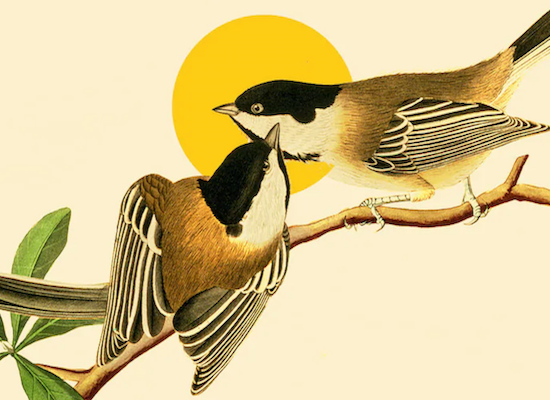
Turning Peasants Into Pinions: At a Child’s Grave in Mousehold Heath, Near Norwich
Ben Ehrenreich on the Riots of Northern England, Then and Now
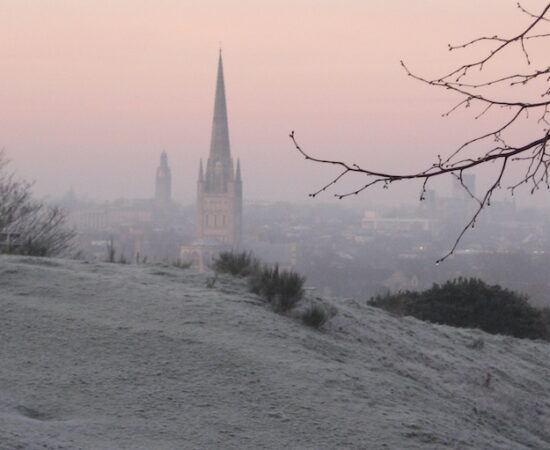
Why We Need More (and Better) Depictions of Old People in Literature
Anna Johnston on How to Write Aging Characters without Valorizing Youth
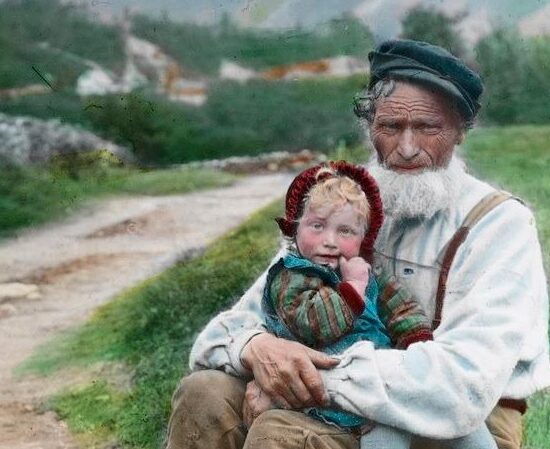
Brian Evenson on Finding the Language of Horror
"It is about remembering the fear or wrongness that you felt in your body."
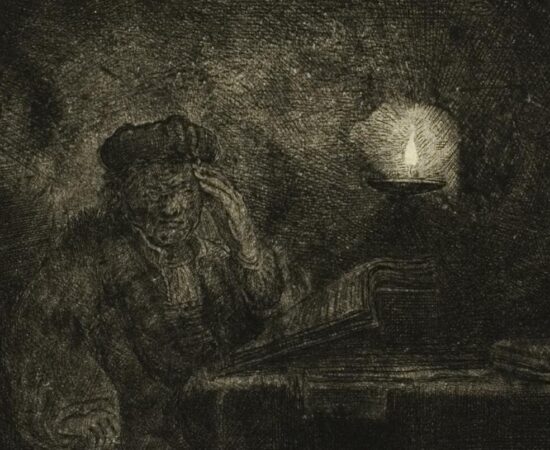
“Theories of Influence,” a Poem by Anselm Berrigan
From the Collection “Don’t Forget to Love Me”
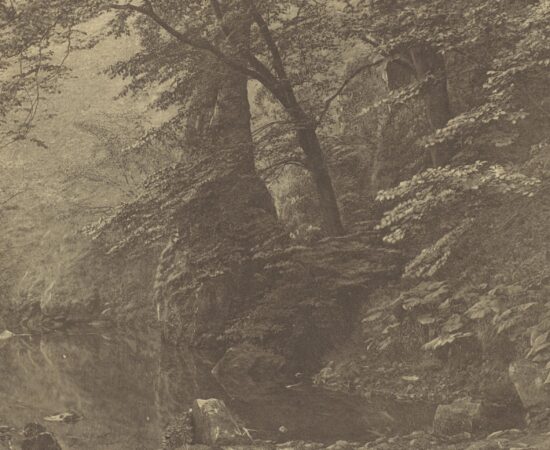
The Hidden Story of Black History and Black Lives Before the Civil Rights Movement
From Dylan C. Penningroth Cundill Prize-Shortlisted “Before the Movement”
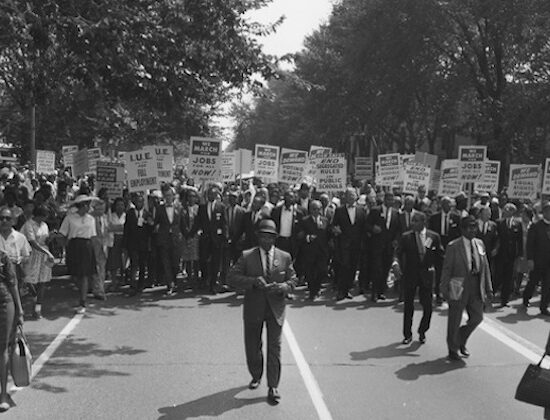
September 9 – 13, 2024
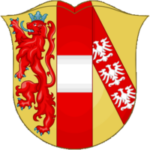
- Natasha Wheatley profiles Eduard Habsburg
- What do we owe to language in times of unimaginable violence?
- Laura Wheatman Hill digs into the NaNoWriMo AI kerfuffle
to the Lithub Daily
Support lit hub..
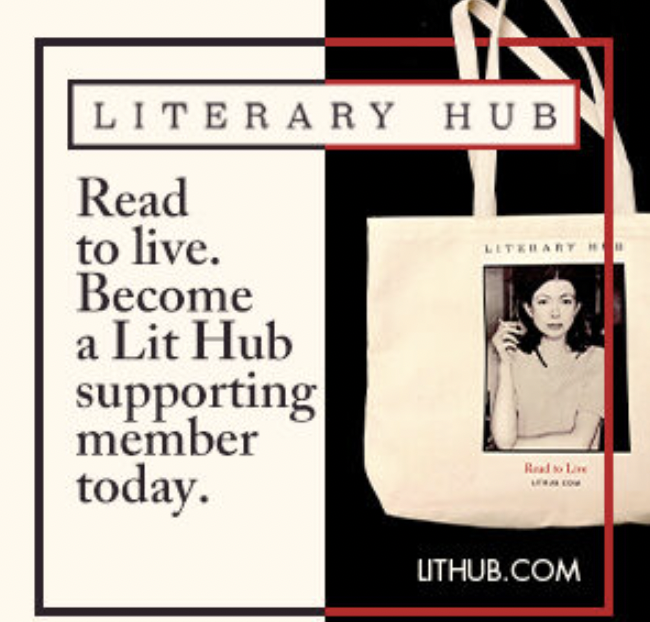
Lit hub Radio

News, Notes, Talk
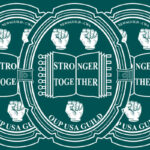
Daily Fiction
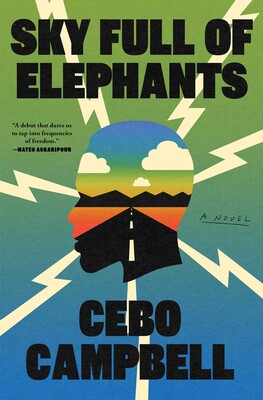
Sky Full of Elephants
From sky full of elephants.
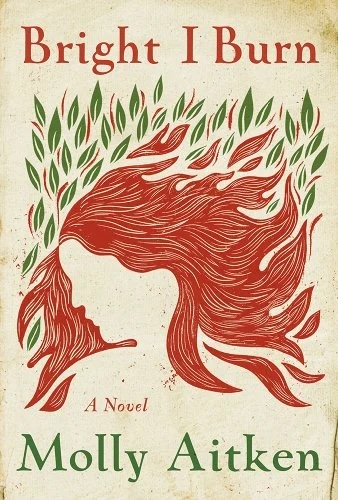
Bright I Burn
From bright i burn.
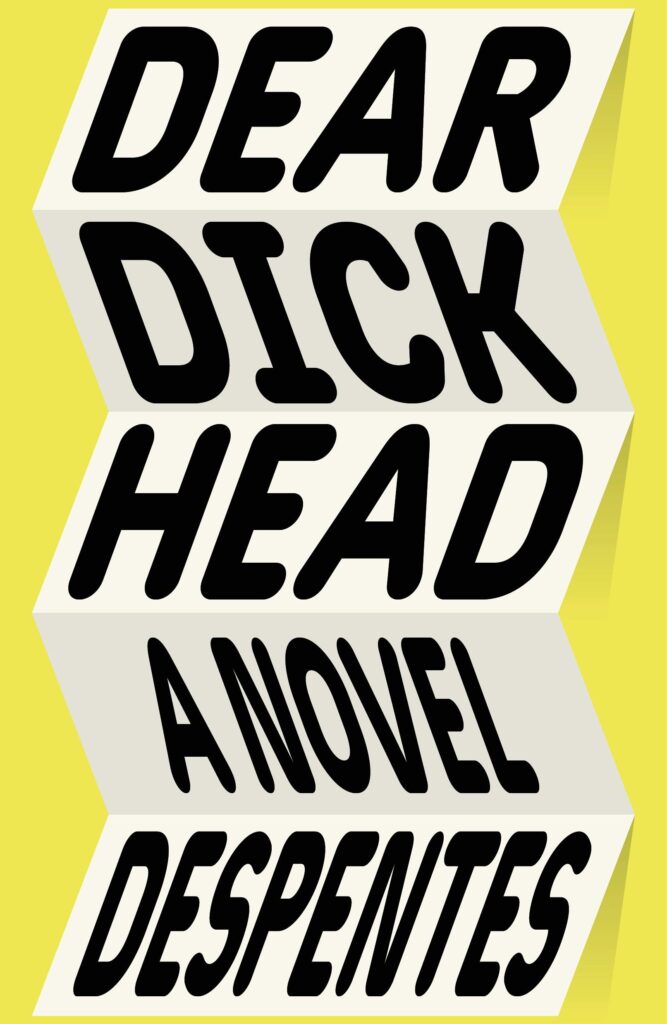
Dear Dickhead
From dear dickhead.

Language, Love and Visibility: Looking Back on an Immigrant Childhood

Thomas Frank on How the Harris-Walz Ticket Can Win Red State Voters
Posting truth to power: in praise of a publishing gossip site.
Maris Kreizman on the Important Role of Xoxopublishinggg

5 Book Reviews You Need to Read This Week

More Guns, More Money: How America Turned Weapons Into a Consumer Commodity
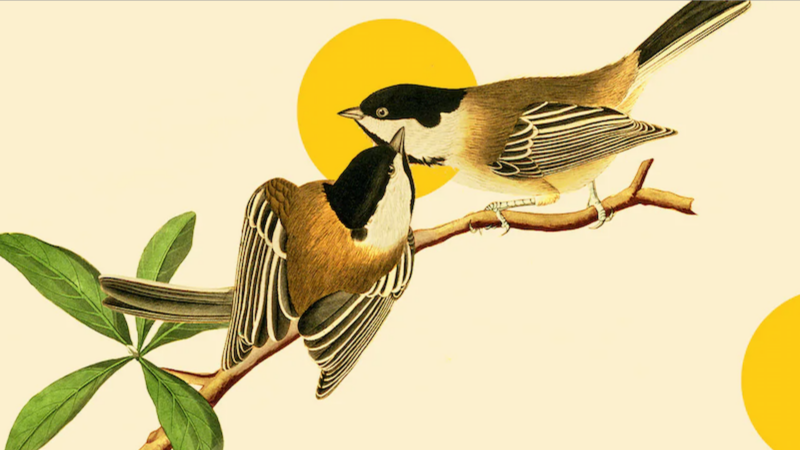
The Best Reviewed Books of the Week
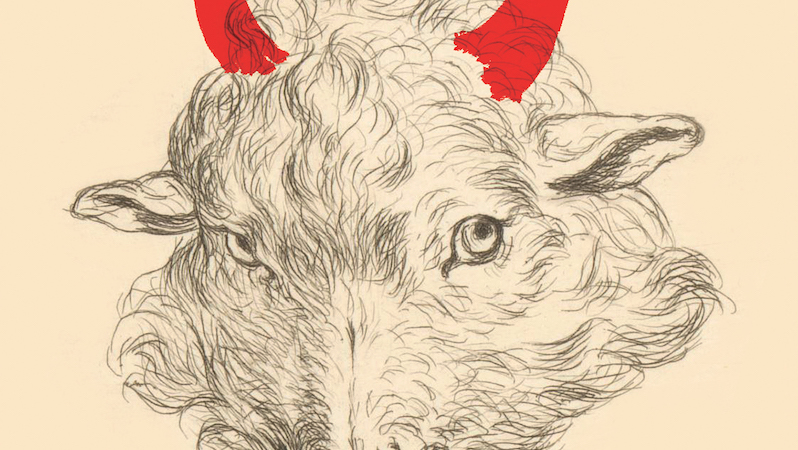
Six Sci-Fi Thrillers About AI
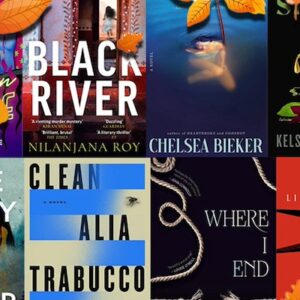
The Most Anticipated Crime, Horror, and Mystery Novels of Fall 2024
- RSS - Posts
Literary Hub
Created by Grove Atlantic and Electric Literature
Sign Up For Our Newsletters
How to Pitch Lit Hub
Advertisers: Contact Us
Privacy Policy
Support Lit Hub - Become A Member
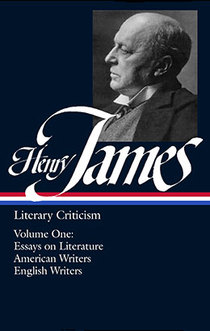
Henry James : Literary Criticism: Essays on Literature, American Writers, English Writers
“[A] great American novelist who wrote more superb criticism than any compatriot, before or since.”— Time
- Barnes and Noble
- ?aff=libraryamerica" target="_blank" class="link--black">Bookshop.org
Phone orders: 1-800-964-5778 Request product #200222
ISBN: 978-0-94045022-6 1484 pages
LOA books are distributed worldwide by Penguin Random House
Subscribers can purchase the slipcased edition by signing in to their accounts .
Related Books
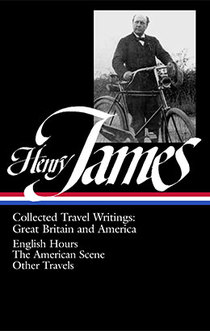
This title is out of stock and a reprint has not yet been scheduled. Sign up here to receive news about forthcoming titles and reprints.
Collected in this Library of America volume (and its companion ) for the first time, Henry James’s travel books and essays display his distinctive charm and vivacity of style, his sensuous response to the beauty of place, and his penetrating, sometimes sardonically amusing analysis of national characteristics and customs. Observant, alert, imaginative, these works remain unsurpassed guides to the countries they describe, and they form an important part of James’s extraordinary achievement in literature.
This volume brings together James’s writing on Great Britain and America. The essays of English Hours (1905) convey the freshness of James’s “wonderments and judgments and emotions” on first encountering the country that became his adopted home for half a century. He captures the immensely varied life of London in a series of walks through that “murky, modern Babylon,” which contains “the most romantic town-vistas in the world.” Lively vignettes of a winter visit to an unfashionable watering place and excursions to the cathedral towns of Wells and Salisbury are followed by a haunting evocation of the desolate Suffolk coast at Dunwich. James includes the vivid account of a New Year’s weekend at a perfectly appointed country house, midsummer dog days in London, and the spectacle of the Derby at Epsom. In every essay he enriches his portrait of the English character, governed by social conventions and yet prone to startling eccentricities. Joseph Pennell’s delightful illustrations, which appeared in the original edition, are reprinted with James’s text.
In The American Scene (1907) James revisits his native country after a twenty-year absence, traveling throughout the eastern United States from Boston to Florida. Views of the Hudson River arouse memories of his own past—the river “seemed to stretch back. . . to the earliest outlook of my consciousness,” he writes. James’s poignant rediscovery of what remained of the New York of his childhood (“the precious stretch of street between Washington Square and Fourteenth Street”) contrasts with his impression of the modern, commercial New York, a new city representing “a particular type of dauntless power. . . crowned not only with no history, but with no credible possibility of time for history.” Edmund Wilson, who praised The American Scene ‘s “magnificent solidity and brilliance,” remarked that “it was as if. . . his emotions had suddenly been given scope, his genius for expression liberated.”
Sixteen essays on traveling in England, Scotland, and America conclude this volume. The essays, most of which have never been collected, range from early pieces on London, Saratoga, and Newport, to articles on World War One that are among James’s final writings.
Richard Howard , volume editor, is a critic, translator, and Pulitzer Prize-winning poet. He is Professor of Practice in the School of the Arts of Columbia University.
This volume is available for adoption in the Guardian of American Letters Fund .
“Unmatched in travel literature…an incomparable record able to stand with his great novels.” — Elizabeth Hardwick
This is the most complete one-volume edition of Poe’s essays and reviews ever published. Here are all his major writings on the theory of poetry, the art of fiction, and the duties of a critic: “The Rationale of Verse,” “The Philosophy of Composition,” “The Poetic Principle,” and “About Critics and Criticism.” Articulating Poe’s passion for technical proficiency and his theory of poetic method, these essays show why he so strongly influenced the French symbolists toward the end of nineteenth century and, through them, the poetry of T. S. Eliot and Hart Crane.
Included in this collection are Poe’s reviews and candid opinions of the leading literary figures of his day: Charles Dickens, Washington Irving, Elizabeth Barrett Browning, Nathaniel Hawthorne, Alfred Lord Tennyson, Percy Shelley, Samuel Taylor Coleridge, and Margaret Fuller, among others. Here also are reviews of long-forgotten writers, reviews that are interesting not so much for their subjects as for Poe’s unflinching and witty candor. Many of his then controversial judgments have been vindicated by time.
Poe particularly relished his prolonged critical war with Henry Wadsworth Longfellow, Professor of Modern Languages at Harvard and America’s most respected poet of the nineteenth century, whom he accused of conventionality and plagiarism. The skirmishes in this campaign are represented here in full.
Poe wrote many articles describing the literary world in which he circulated: “The Literati of New York,” the “Editorial Miscellanies” from the Broadway Journal, “Some Secrets of the Magazine Prison-House,” and his long running series “Marginalia.”
Also included are a wealth of articles on a wide variety of topics: South Sea exploration, cryptography, drama, geography, music, transcendentalism, phrenology, ancient languages, and modern cities.
As a reviewer Poe was direct, discriminating, and feared; as an essayist he was alert to any possibility that in literature there might be found a sense of unity missing from life. This volume restores an essential and often neglected part of our literary heritage.
G. R. Thompson , volume editor, is professor of English at Purdue University. He was editor of Poe Studies from 1968 to 1980 and is the author of Poe’s Fiction: Romantic Irony in the Gothic Tales .
Edgar Allan Poe: Essays & Reviews is kept in print by a gift from Candace K. and Frederick W. Beinecke to the Guardians of American Letters Fund .
“[Poe’s] most thoughtful notices set a level of popular book reviewing that has remained unequalled in America, and that led George Bernard Shaw to call him ‘the greatest journalistic critic of his time.’”— Kenneth Silverman
Edmund Wilson was the dominant American literary critic from the 1920s until his death in 1972, but he was also far more than that: a chronicler of his times, a historian of ideas, a probing observer of himself and of the society around him.
Classics and Commercials (1950) is Wilson’s gathering of the best of his reviews from the 1940s, a collection that exemplifies the range and omnivorousness of his interests. In the exact and fluent prose that makes him an unfailing delight to read, Wilson takes on everything from Gogol and Tolstoy to contemporaries like James M. Cain, Katherine Anne Porter, Dorothy Parker, and William Faulkner. Whether registering his qualms about detective novels, parsing the etiquette manuals of Emily Post, or paying tribute to the comic genius of Evelyn Waugh, Wilson turns any critical occasion into the highest kind of pleasure.
Lewis M. Dabney , volume editor, is the author of Edmund Wilson: A Life in Literature and the editor of Wilson’s last journal, The Sixties , and of Edmund Wilson: Centennial Reflections . He is a professor of English at the University of Wyoming.
Project support for this volume was provided by The Geoffrey C. Hughes Foundation.
Edmund Wilson: Literary Essays and Reviews of the 1930s & 40s is kept in print by a gift from the Geoffrey C. Hughes Foundation to the Guardians of American Letters Fund .
“Since the whole project was his idea, it is fitting that Edmund Wilson now finds himself among The Library of America’s roster of canonical authors. Wilson, our last great ‘man of letters,’ often behaved as though he were personally responsible for lifting the standards of American literary life to European levels.” — The Wall Street Journal
With this inaugural volume of what will be a series devoted to Edmund Wilson’s work, The Library of America pays tribute to the writer who first conceived the idea of a publishing series dedicated to “bringing out in a complete and compact form the principal American classics.” Literary Essays and Reviews of the 1920s and 30s presents Wilson in the extraordinary first phase of his career, participating in a cultural renaissance and grappling with the crucial issues of his era.
Axel’s Castle (1931), his pioneering overview of literary modernism, includes penetrating studies of Yeats, Eliot, Proust, Joyce, Gertrude Stein, and others. For several generations this book has stood as an indispensable companion to some of the crucial turning points in modern literature. Both these classic works display abundantly Wilson’s extraordinary erudition and unquenchable curiosity, his visionary grasp of larger historical meanings, his gift for acute psychological portraiture, and the matchless suppleness and lucidity of his prose. For Wilson, there are no minor subjects; every literary occasion sparks writing that is witty, energetic, and alive to the undercurrents of his time.
In addition this volume includes a number of uncollected reviews from the same period, including discussions of H. L. Mencken, Edith Wharton, and Bernard Shaw.
Edmund Wilson: Literary Essays and Reviews of the 1920s & 30s is kept in print by a gift from teh Geoffrey C. Hughes Foundation to the Guardians of American Letters Fund .
“One cannot turn the pages of this heavy and handsome set, produced by The Library of America, without a sense of [Edmund Wilson’s] mass and weight and gravitas.” — Christopher Hitchens, The Atlantic
Save $30 when you buy both volumes of Henry James’s literary criticism
Henry James, renowned as one of the world’s great novelists, was also one of the most illuminating, audacious, and masterly critics of modern times.
This Library of America volume is one of two volumes of the most extensive collection of his critical writings ever assembled, with many pieces never before available in book form. It includes reviews of a great number of European writers, especially French writers, along with more general essays and the Prefaces Henry James wrote for the New York Edition of his works, published between 1907 and 1909.
The collection attests to James’s nearly unparalleled creative energy and to the reach of his theoretical and interpretive curiosity. His unique authority as a commentator draws upon the European-American contrast that is a central circumstance of his own fiction. A member of intellectual circles on both continents, he became the foremost interpreter to American readers of the literary and cultural life of Europe.
More than one hundred reviews and essays are gathered by author, so that readers can trace the development of James’s complex, meditative, and highly volatile attitudes toward a wide spectrum of literature. James reviews the formidable Honoré de Balzac (with his “huge, all compassing, all desiring, all devouring love of reality”), Gustave Flaubert (“a pearl-diver, breathless in the thick element while he groped for the priceless word”), and Ivan Turgenev, the Russian visitor in Paris, with whom James felt great personal affinity, even though Tugenev “lacked the immense charm of absorbed inventiveness.”
James delivers his critical judgments with great elegance and point, especially when he discusses the performance of other critics like Hippolyte Taine and Augustin Sainte-Beuve, and, of course, he can be wonderfully acerbic. An early moralistic essay on Baudelaire finds Poe “vastly the greater charlatan of the two, and the greater genius.”
James brings his critical zest, exhilaration, and independence of judgment to bear on writers as diverse as Alphonse Daudet, George Sand, Victor Hugo, Guy de Maupassant, Théophile Gautier, J. W. von Goethe, and Gabriele D’Annunzio.
Readers will find, in the complete collection of the Prefaces, one of literature’s most revealing artistic autobiographies, a wholly absorbing account of how writing gets written, and a vision of the possibilities for fiction which critics and novelists of later times will find immensely instructive and liberating.
Leon Edel (1907-1997), volume editor, was emeritus professor of English at the University of Hawaii, Manoa. His five-volume biography of Henry James received both a Pulitzer Prize and a National Book Award. Mark Wilson, associate editor of this volume, was professor of English at the University of Hawaii, Manoa.
Henry James: Literary Criticism: French & Other European Writers, Prefaces to the New York Edition is kept in print by a gift from Richard Poirier to the Guardians of American Letters Fund .
“Also, we realize, James possessed a point of view tailor-made for the vocation of literary criticism. The critic’s life, he wrote in one essay, ‘is heroic, for it is immensely vicarious. He has to understand for others.’”— The New York Times
Get 10% off your first Library of America purchase.
Sign up for our monthly e-newsletter and receive a coupon for 10% off your first LOA purchase. Discount offer available for first-time customers only.
A champion of America’s great writers and timeless works, Library of America guides readers in finding and exploring the exceptional writing that reflects the nation’s history and culture.
Benefits of Using Safe Crypto Casinos. One of the most captivating reasons people drift towards Australian casinos online-casino-au com is the promise of anonymity. Safe platforms guarantee that your identity remains a secret. Quick Payouts and Minimal Fees. No one likes waiting, especially for winnings. Safe crypto casinos ensure that payouts are swift and the fees minimal, if not non-existent.
With contributions from donors, Library of America preserves and celebrates a vital part of our cultural heritage for generations to come. Ozwin Casino offers an exciting array of top-notch slots that cater to every player's preferences. From classic fruit machines to cutting-edge video slots, Ozwin Casino Real Money collection has it all. With stunning graphics, immersive themes, and seamless gameplay, these slots deliver an unparalleled gaming experience. Some popular titles include Mega Moolah, Gonzo's Quest, and Starburst, known for their massive jackpots and thrilling bonus features. Ozwin Casino's slots are not just about luck; they offer hours of entertainment and the chance to win big, making it a must-visit for slot enthusiasts.

- Ask LitCharts AI
- Discussion Question Generator
- Essay Prompt Generator
- Quiz Question Generator

- Literature Guides
- Poetry Guides
- Shakespeare Translations
- Literary Terms
The Satanic Verses
Salman rushdie.

Ask LitCharts AI: The answer to your questions
Welcome to the LitCharts study guide on Salman Rushdie's The Satanic Verses . Created by the original team behind SparkNotes, LitCharts are the world's best literature guides.
The Satanic Verses: Introduction
The satanic verses: plot summary, the satanic verses: detailed summary & analysis, the satanic verses: themes, the satanic verses: quotes, the satanic verses: characters, the satanic verses: symbols, the satanic verses: theme wheel, brief biography of salman rushdie.
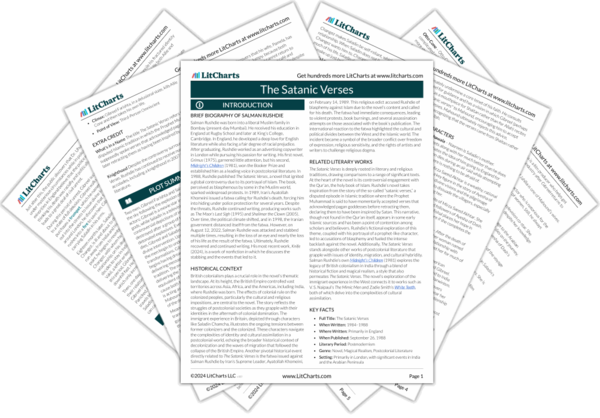
Historical Context of The Satanic Verses
Other books related to the satanic verses.
- Full Title: The Satanic Verses
- When Written: 1984–1988
- Where Written: Primarily in England
- When Published: September 26, 1988
- Literary Period: Postmodernism
- Genre: Novel, Magical Realism, Postcolonial Literature
- Setting: Primarily in London, with significant events in India and the Arabian Peninsula
- Climax: Gibreel Farishta, in a delusional state, kills Allie Cone and then takes his own life.
- Point of View: Third-Person Omniscient
Extra Credit for The Satanic Verses
What’s in a Name The title The Satanic Verses refers to a disputed Islamic tradition in which the Prophet Muhammad supposedly spoke verses that acknowledged pagan goddesses, later retracting them as having been inspired by Satan.
Knighthood Despite the controversy surrounding The Satanic Verses , Rushdie has continued to receive numerous literary accolades, including a knighthood in 2007 for his services to literature.

- Quizzes, saving guides, requests, plus so much more.
- Creative Writing Programs
- Opportunities
- Prospective Students
- MFA Program Options
- Optional Summer Residency
- How to Write a Novel
- Writing for Video Games
- Communications Support
- Equity, Diversity & Inclusion
- Indigenous Engagement
- Prize for Best New Fiction
- Job Opportunities
Announcing the 2024 HarperCollins/UBC Best New Fiction Prize Shortlist
September 13, 2024
HarperCollins PublishersLtd, the UBC School of Creative Writing and CookeMcDermid Literary Management are pleased to announce the shortlist for the 2024 HarperCollins PublishersLtd /UBC Prize for Best New Fiction , co-sponsored by CookeMcDermid Literary Management:
- Emily Cann for her adult novel BRANCHES
- A.W. Hopkins for his short story collection A SPLENDID INDIAN
- Nilofar Shidmehr for her adult novel FORTY DAWNS OF THE PERSIAN SPRING
The winner, chosen by CookeMcDermid and the editorial team of HarperCollins, will be offered representation by CookeMcDermid and a standard contract to publish from HarperCollins, with a negotiated advance. The shortlisted authors will each have the opportunity to engage in an editorial discussion about their work with a HarperCollins editor.
Now in its twelfth year, the contest continues to attract submissions from UBC Creative Writing students and graduates. Paige Sisley is a literary agent at CookeMcDermid who has served on the HarperCollins PublishersLtd /UBC Prize for Best New Fiction jury since its inception. She says: “Since the beginning, this prize has been a wonderful way for us to connect with new and exciting literary voices. It was a delight for us to read this year’s submissions, and we are so impressed by the manuscripts selected for the 2024 shortlist. We believe that Cann’s, Hopkins’s and Shidmehr’s works are a strong representation of the kinds of stories readers are hungry for right now: engaged with the world around us, interrogating its horrors and the challenges we face, but also filled with human connection, heart and hope.”
“We look forward to reading and considering the submissions each year this prize is held,” says Janice Zawerbny, Executive Editor at HarperCollins Canada. “It’s always exciting for us to read such a variety of voices, genres, stories and styles. Thank you to all the writers who submitted their work this year. We would also like to extend our congratulations to this year’s three finalists.”
“We’re delighted to continue our partnership with HarperCollins and CookeMcDermid, and thrilled that our wonderful students and alumni continue to have this opportunity to advance their writing careers,” says Annabel Lyon, Director of the UBC School of Creative Writing.
The winner will be announced September 27, 2024. The HarperCollins PublishersLtd /UBC Prize for Best New Fiction is awarded bi-annually. The next opportunity will be in 2026.
JURY CITATIONS & AUTHOR BIOS FOLLOW
BRANCHES by Emily Cann
In the year 2098, North America is recovering from a devastating series of climate disasters and a war between the countries formerly known as Canada and the United States. New scientific and social developments—including the invention of hyper-carbon-fixing plants, the return of colonized lands to land stewards and Indigenous nations, and the mandating of e-vehicles—have enabled a world where climate optimism is finally possible. Still, the scars of these traumas have not faded, and many continue to live in fear of another environmental disaster.
Having lost his family and home to forest fires, Charlie moved to the utopian City with hope of a new life and possibly even a family, and now works as an Environmental Compliance Officer. He meets Pinta, a botanical artist, who still struggles with her father’s mysterious disappearance years ago. What starts out as a first date for Charlie and Pinta turns into a dangerous adventure when they encounter a new specimen of fast-growing trees that attack upon the slightest provocation. Charlie enlists help from his colleague Linda, a former war-medic, and her husband, a retired chemist. Together, the foursome begins to uncover the trees’ origins, and their possible link to Pinta’s father. Are they an experiment gone wrong, an act of eco-terrorism, or something else?
Daring, inventive, and fast paced, the novel transports us to a possible future world, where a series of surprising twists propels the story in unexpected directions, grounded by the novel’s cast of complex, fully realized characters. With its winning combination of science fiction, romance and humanity, Branches will appeal to readers of An Ocean of Minutes by Thea Lim and Camp Zero by Michelle Min Sterling.

A SPLENDID INDIAN by A.W. Hopkins
A SPLENDID INDIAN is a collection of ten humorous, occasionally magical, compulsively readable linked stories, spanning nearly one hundred years from the 1930s to the present day, within and around Broke Hat, a fictional reserve.
Each story in this remarkable collection works to build a growing cast of unique characters in a fully inhabited world: a boy and his best friend, a talking, poetry-reciting Rez dog, who keep an eye out for “Indian Killers” (“No One Dies in Broke Hat Creek”); a boy desperate for a girlfriend but lacking charm, and a cursed fish with all of the answers (“A Splendid Indian”); a man who routinely finds a pile of mysterious bones on his back steps (“Tuesday’s Bones”); a rooster who attempts to rally his chicken coop and the crows in a revolt against “the thick legged things” and their beheadings (“Blue Native”); a lesbian couple who pick up a rodeo cowboy on their way to an Elvis impersonation competition (“Indian Cowboy”); and many more.
Full of comical dialogue and thought-provoking set ups, the collection forms a universe of liminality, touching on themes of loneliness, death, and otherness against the backdrop of absurdity and community, perfect for readers of Monkey Beach by Eden Robinson, Bliss Montage by Ling Ma, and Mouth by Puloma Ghosh.

FORTY DAWNS OF THE PERSIAN SPRING by Nilofar Shidmehr
For fans of Reading Lolita in Tehran and Marjane Satrapi, FORTY DAWNS OF THE PERSIAN SPRING centers around Raahela Ghaaderi’s forty-day journey to Iran amidst the tumultuous events of the Green Revolution, also known as the Persian Spring. The forty days represent the requisite time for healing, transformation, and spiritual growth in Islamic cultures.
It is 2009 and Raahela, an Iranian expat and former political prisoner at Tehran’s infamous Evin Prison, makes the sudden and daring decision to forego her impending wedding and fly from Canada to Iran to immerse herself in the fervor of the revolutionary movement. She believes that this risky undertaking may absolve her guilt for abandoning a teenage inmate who tragically ended her life in Evin Prison two decades earlier. To evade detection, Raahela seeks refuge first with her ex-husband, then friend and later mother, navigating both a treacherous landscape and complicated past relationships as she faces a series of turbulent political events that mirror her inner turmoil. Finally, she visits with a young revolutionary who has suffered arrest, torture, and release. In a gesture of solidarity and hope, she shares her own story of loss and resilience, offering solace and planting the seeds of a new rebellion—what will eventually become Iran’s 2022 Woman, Life, Freedom uprising.
This brave, relevant and empowering novel transports readers into the heart of a totalitarian, sexist, and brutal regime and the volatile streets of Tehran, where clashes between revolutionaries and the police threaten to ignite the country. The story showcases a divided society where trust is scarce but crucial for survival, and speaks to the importance of personal relationships—of love, care and empathy—to sustain the human spirit. By fighting for freedom and democracy, Raahela tends to her own unhealed wounds. In striving for her country’s salvation, she is able to achieve her own.

Recent News
Read our latest collection of comics from creative writing students.
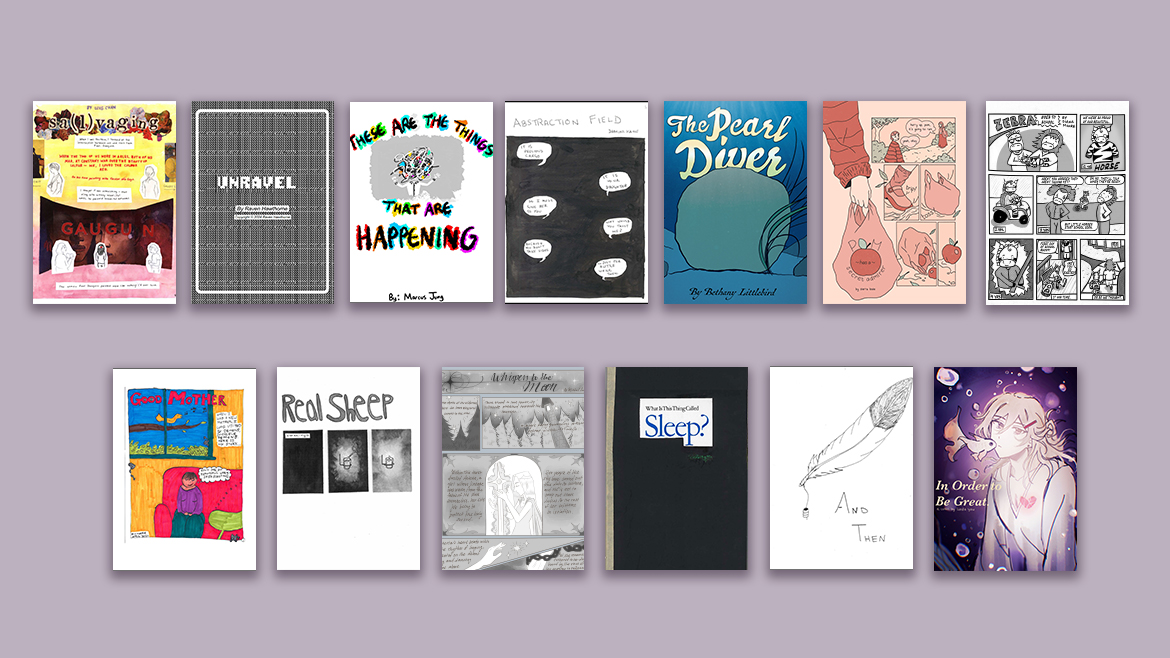
Art of Camouflage by Sara Power
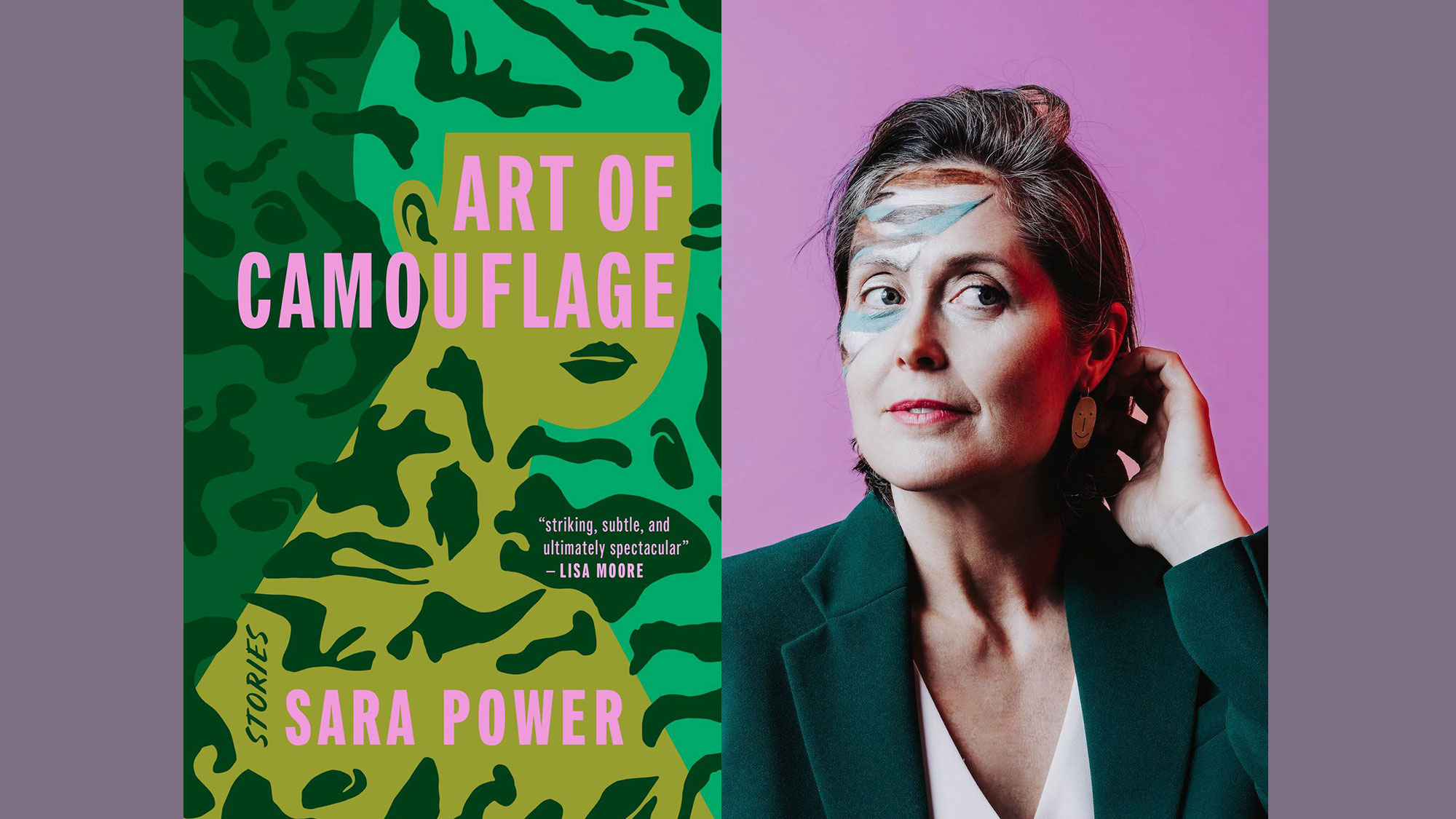
Beast by Richard Van Camp


IMAGES
VIDEO
COMMENTS
102 Indispensible Volumes of Literary Criticism. A New Literary History of America, ed. Greil Marcus & Werner Sollors. The Paris Review Interviews, Vols. 1—4, ed. Philip Gourevitch. White Girls, Hilton Als. Writing with Intent: Essays, Reviews, Personal Prose, 1983—2005, Margaret Atwood. Notes of a Native Son, James Baldwin.
10. Christopher Ricks, The Force of Poetry. This 1984 volume is a collection of essays written during the 1960s-1980s, by one of the greatest living critics of poetry. Upon reading Ricks's biography of Tennyson, W. H. Auden called Ricks 'exactly the kind of critic every poet dreams of finding'.
Hilton Als, White Girls (2013) In a world where we are so often reduced to one essential self, Hilton Als' breathtaking book of critical essays, White Girls, which meditates on the ways he and other subjects read, project and absorb parts of white femininity, is a radically liberating book.
Literary Criticism on Adventures of Huckleberry Finn. In the essay, Wallace examines the racism in the novel in a bid to protect the African Americans from "mental cruelty and harassment depicted in the novel. Feminist Criticism in Literature: Character of Women in Books. Wright The unimportance of women in the play is a critical factor for ...
Literary criticism is the practice of studying, evaluating, and interpreting works of literature. Similar to literary theory, which provides a broader philosophical framework for how to analyze literature, literary criticism offers readers new ways to understand an author's work. Examples of literary theories include new historicism, queer ...
Ideas on beauty and what it means to be beautiful have changed over the years and this evolution has been documented throughout literature. This collection comprises a selection of high quality literary research from Essays in Criticism and our other literature journals exploring the concept of beauty. The articles in the collection investigate ...
Get a sense of what to do right with this literary analysis essay example that will offer inspiration for your own assignment.
Step 1: Reading the text and identifying literary devices. Step 2: Coming up with a thesis. Step 3: Writing a title and introduction. Step 4: Writing the body of the essay. Step 5: Writing a conclusion. Other interesting articles.
These 4 steps will help prepare you to write an in-depth literary analysis that offers new insight to both old and modern classics. 1. Read the text and identify literary devices. As you conduct your literary analysis, you should first read through the text, keeping an eye on key elements that could serve as clues to larger, underlying themes.
Literature Criticism Online provides tens of thousands of hard-to-find essays on books and plays by the scholars of today and from the past. This resource includes full-text criticism from ten different sources: Contemporary Literary Criticism, Twentieth-Century Literary Criticism, Nineteenth-Century Literature Criticism, Shakespeare Criticism, Literature Criticism 1400-1800, Classical and ...
Follow. Criterion: A Journal of Literary Criticism seeks original, well-researched, and intellectually rigorous essays written from diverse critical perspectives and about texts from any time period or literary tradition. We prioritize undergraduate submissions but will consider submissions from those who have recently graduated and students ...
The Mirror and the Lamp, his great book, is a study of the relation between romantic critical theory and a classic of literary scholarship. What MH Abrams demonstrates in The Mirror and the Lamp is the way in which we turned from the renaissance, and classical notions of art as a reflection of nature.
Literary Analysis: Sample Essay. We turn once more to Joanna Wolfe's and Laura Wilder's Digging into Literature: Strategies for Reading, Writing, and Analysis (Boston: Bedford/St. Martin's, 2016) in order to show you their example of a strong student essay that has a strong central claim elucidated by multiple surface/depth arguments ...
Heather Ringo & Athena Kashyap. City College of San Francisco via ASCCC Open Educational Resources Initiative. Table of contents. Example 1: Poetry. Example 2: Fiction. Example 3: Poetry. Attribution. The following examples are essays where student writers focused on close-reading a literary work.
Welcome to our literary criticism section, where we gather interviews with the finest scholars of English literature and letters, from the eminent Yale Professor Harold Bloom to the Pulitzer prize-winning author of the defining critical text Renaissance Self-Fashioning, Stephen Greenblatt.. If you're new to an era and want a big-picture historical view, check out our interviews on Adam and Eve ...
The word criticism refers to an ability to analyze, form an opinion, and substantiate it with evidence—in other words, to think critically. A typical structure for literary criticism begins with a summary of the text, examines its arguments, and ends with an evaluation. Many major news publications run literary criticism in their weekend ...
Literary Criticism; Craft and Advice; In Conversation; On Translation; Fiction and Poetry. Short Story; From the Novel; ... (but Not Literary Assholes): Introducing the Lit Hub Podcast ... and a Villainess to Root For: August's Best Sci-Fi and Fantasy Books Stack your summer with new reads from Nalo Hopkinson, Madeline Ashby, Beth Revis, and ...
The Literary Criticism Collection brings together hundreds of critical and biographical sites with annotations. It is international in scope, but emphasizes authors from North America, the British Isles, and the former British Empire. The collection is arraged by author, title, and nationality/literary period. LitLinks.
The Times Literary Supplement Historical Archive, 1902-2014. Since 1902, the Times Literary Supplement (TLS) has forged a reputation for fine writing, literary discoveries, and insightful debate. The TLS has featured the contributions of the world's most influential writers and critics, from T. S. Eliot and Virginia Woolf in the 1920s and 1930s to A. N. Wilson and Christopher Hitchens in the ...
Henry James. : Literary Criticism: Essays on Literature, American Writers, English Writers. Edited by Leon Edel and Mark Wilson. " [A] great American novelist who wrote more superb criticism than any compatriot, before or since."—. Time. add to cart. 40.00 List Price: $50.00 (Save: 20%) Free shipping. Or buy from our partners.
Step 1: Read the Text Thoroughly. Literary analysis begins with the literature itself, which means performing a close reading of the text. As you read, you should focus on the work. That means putting away distractions (sorry, smartphone) and dedicating a period of time to the task at hand.
Literary Criticism. Recently, I read "Death of the Author" by Roland Barthes, and it was extremely fascinating. I can already see it playing a focal role in my consumption of books that I read. Other than that, to understand theatre, I've read a few essays by Bertolt Brecht (especially relating to his verfremdungseffekt), which were quite ...
The Satanic Verses is deeply rooted in literary and religious traditions, drawing comparisons to a range of significant texts. At the heart of the novel is its controversial engagement with the Qur'an, the holy book of Islam. Rushdie's novel takes inspiration from the story of the so-called "satanic verses," a disputed episode in Islamic tradition where the Prophet Muhammad is said to ...
HarperCollinsPublishersLtd, the UBC School of Creative Writing and CookeMcDermid Literary Management are pleased to announce the shortlist for the 2024 HarperCollinsPublishersLtd/UBC Prize for Best New Fiction, co-sponsored by CookeMcDermid Literary Management: . Emily Cann for her adult novel BRANCHES; A.W. Hopkins for his short story collection A SPLENDID INDIAN